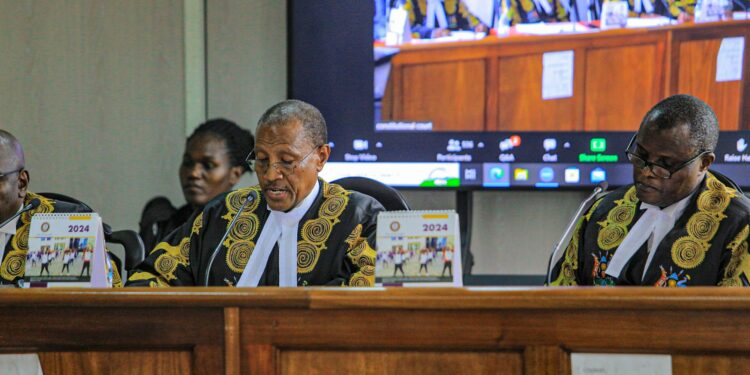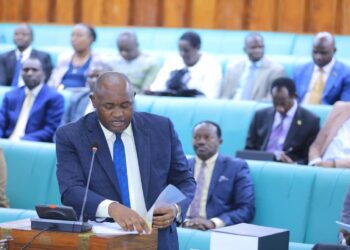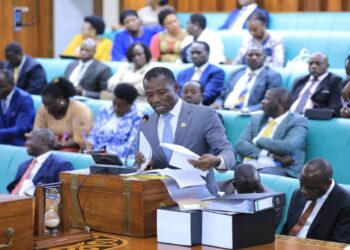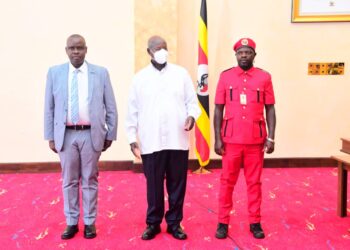The Constitutional Court on Wednesday delivered its decision in the Consolidated Petitions No. 14, 15, 16 and 85 of 2023 and declared that the Anti-Homosexuality Act of 2023 complies with the Constitution of Uganda except in only four aspects.
A panel consisting of five Justices, with Deputy Chief Justice Hon. Justice Richard Buteera presiding, alongside Justice Geofrey Kiryabwire, Justice Monica Mugenyi, Justice Kibeedi Muzamiru, and Justice Christopher Gashirabake, delivered the decision.
In their ruling, the court nullified Sections 3(2)(c), 9, 11(2)(d) and 14 of the Anti-Homosexuality Act, 2023 for contravening the Constitution of Uganda, 1995.
This was in the unanimous judgment delivered today, the 3rd of April 2024, by the panel of five justices of the Constitutional Court, led by the Deputy Chief Justice in Consolidated Constitutional Petition Nos. 14, 15, 16 & 85 of 2023 Hon. Fox Oywelowo Odoi, Prof. Sylvia Tamale, Advocate Rutaro Robert, Bishop James Lubega Banda and 18 others Vs Attorney General and 3 Others.
According to the ruling, the nullified Sections had criminalised the letting of premises for use by homosexual purposes, the failure by anyone to report acts of homosexuality to the Police for appropriate action, and the engagement in acts of homosexuality by anyone which results in the other person contracting a terminal illness.
The basics of the ruling
In its Judgment, the Constitutional Court upheld the constitutionality of the AntiHomosexuality Act save the four provisions already mentioned above, and in making its decision, the Constitutional Court considered basics such as;
The legislation and judicial decisions from sister jurisdictions have decriminalised consensual homosexuality between adults in private spaces.
The absence of consensus at the global level regarding non-discrimination based on sexual orientation, gender identity, gender expression and sex characteristics (SOGIESC). This is reflected in that non-discrimination based on the SOGIESC variables has not explicitly found its way into international human rights treaties. Instead, it has been ‘vetoed’ by a bloc of resistant (UN) member states that has prevented the adoption of a binding declaration or similar instrument to strengthen protections for LGBTQ human rights.
The conflict in international human rights law between upholding a universal understanding of human rights and respecting the diversity and freedom of human cultures, with no one culture entirely diminishing the dignity of the other.
The conflict between individuals’ right to self-determination, self-perception and bodily autonomy, on the one hand; and the communal or societal right to social, political and cultural self-determination, calling for a delicate balance between individual autonomy and communal interests.
The recent developments in human rights jurisprudence including the decision of the US Supreme Court in Dobbs v Jackson Women’s Health Organisation, No. 19-1392, 597 U.S. 215 (2022), where the Court considered the nation’s history and traditions, as well as the dictates of democracy and rule of law, to over-rule the broader right to individual autonomy.
The uniqueness of Uganda’s Constitution obliges the courts of law to consider the country’s socio-cultural norms, values and aspirations when resolving any disputes before them.
The Anti-Homosexuality Act being, in general, a reflection of the sociocultural realities of the Ugandan society, and was passed by an overwhelming majority of the democratically elected representatives of the Ugandan citizens.
On behalf of the five judges on the court, Deputy Chief Justice Richard Buteera announced, “Having considered the matter thoroughly, we abstain from nullifying the Anti-Homosexuality Act 2023 in its entirety, nor do we grant a permanent injunction against its enforcement.”
In addition, he said, “We discover that the Anti-Homosexuality Act, 2023 violates the rights to privacy, health, and freedom of religion as guaranteed by the Universal Declaration of Human Rights in Sections 3(2)C, 9, 11(2)d, and 14. As a result, this petition is deemed to be largely successful, and the following orders are made: We now repeal Sections 3(2)C, 9, 11(2)d, and 14 of the Anti-Homosexuality Act. Everybody will pay their own expenses. It is arranged that way.”
Background
In 2023, the Parliament of Uganda passed the Anti-Homosexuality Act following the public outcry, social and broadcast media discussions and homosexuality victims’ ‘painful and gruelling stories’ of children and families that were ‘dying in silence’ from the psychological trauma of forced recruitment of children into homosexual acts. The Act criminalised homosexuality, its recognition, promotion, financing and normalisation.
As soon as the President of Uganda assented to the Anti-Homosexuality law on the 26th of May 2023, four Constitutional Petitions were filed in the Constitutional Court by a total of 22 private citizens and human rights activists challenging virtually all the seventeen sections of the Anti-Homosexuality Act for their alleged infringement of human rights and freedoms that are guaranteed under Uganda Constitution, and international human rights instruments to which Uganda is a party.
The Petitions were opposed by the Attorney General of Uganda, Pastor Martin Sempa, Eng. Stephen Langa and the Family Life Network Limited. Court also benefits from an amicus brief filed by the Secretariat of the Joint United Nations Programme on HIV/ AIDS (UNAIDS).
Do you have a story in your community or an opinion to share with us: Email us at editorial@watchdoguganda.com













